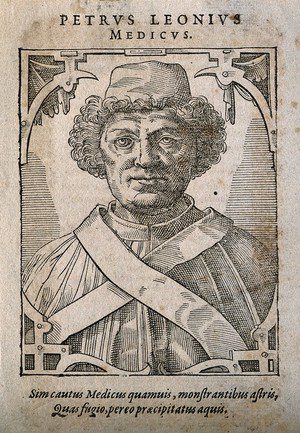
The Umbrian Renaissance physician Pierleone da Spoleto (c. 1445–1492) was a polymath, “one who has studied much” and many different subjects.1,2 Sometimes also called Pier Leoni, he descended from an aristocratic family in Spoleto and is believed to have studied in Rome and obtained degrees in medicine and astrology. He was appointed academic professor in Padua and in Pisa, and for some time was also professor of practical medicine in Padua. Regarded by his contemporaries as one of the most talented men of his time, he wrote on astrology, philosophy, mysticism, medicine, and ancient Greek manuscripts.
In medicine, Pierleone is remembered for two major works. The first, the Opus medicarum curatorium, was a theoretical dissertation on diseases followed by a compendium of all available pharmacological recipes. The second publication, De urinis, consisted of a discussion on using urine as a diagnostic and therapeutic tool. Both works were highly respected at the time of their publication.
Pierleone’s services were requested by illustrious people and sovereigns such as the Duke of Calabria, the King of Naples, Ludovico il Moro, perhaps even Pope Innocent VIII. While in Pisa, he developed contacts and collaborated with many learned figures from Lorenzo de Medici’s court in Florence and also became his personal physician.
When Lorenzo became ill in January 1492, Pierleone was called to attend to him, as did several other physicians such as the one caring for the Duke of Milan. It seems that he recommended no active measures because the situation was hopeless. Lorenzo died on April 8, 1492, and so did Pierleone on the following day.
The circumstances of Pierleone’s death are shrouded in mystery. After Lorenzo’s death, he was escorted to the neighboring villa of Malcantone at San Gervagio and left there. In the early morning hours, his fully clothed body was found dead, thrown headfirst into a well.
No one knows what really happened. Did enemies at court conspire to have him killed? Was he strangled? Did Lorenzo’s son, Piero the Unfortunate (Piero il Fatuo), order his assassination? Some believe Pierleone was blamed for Lorenzo’s death by not being active enough, by limiting his work to astrological consulting, or for not standing up to the physician who prescribed a concoction of crushed gems and pearls that may have accelerated the patient’s death. Suicide has also been suspected. Perhaps he was suffering from depression and Lorenzo’s death merely tipped the scales, but suicide has been largely discounted by historians in that he was buried in consecrated ground. Perhaps he merely went to drink water and accidentally slipped into the well. It all remains a mystery, and after more than five hundred years, the answer may never be forthcoming.
Further reading
- Pearce JMS. Polymathy in decline? Hektoen International 2013;5(4).
- Pearce JMS. What makes a polymath, a genius, or a man who knows everything? Hektoen International History Essays, Winter 2022.

Leave a Reply